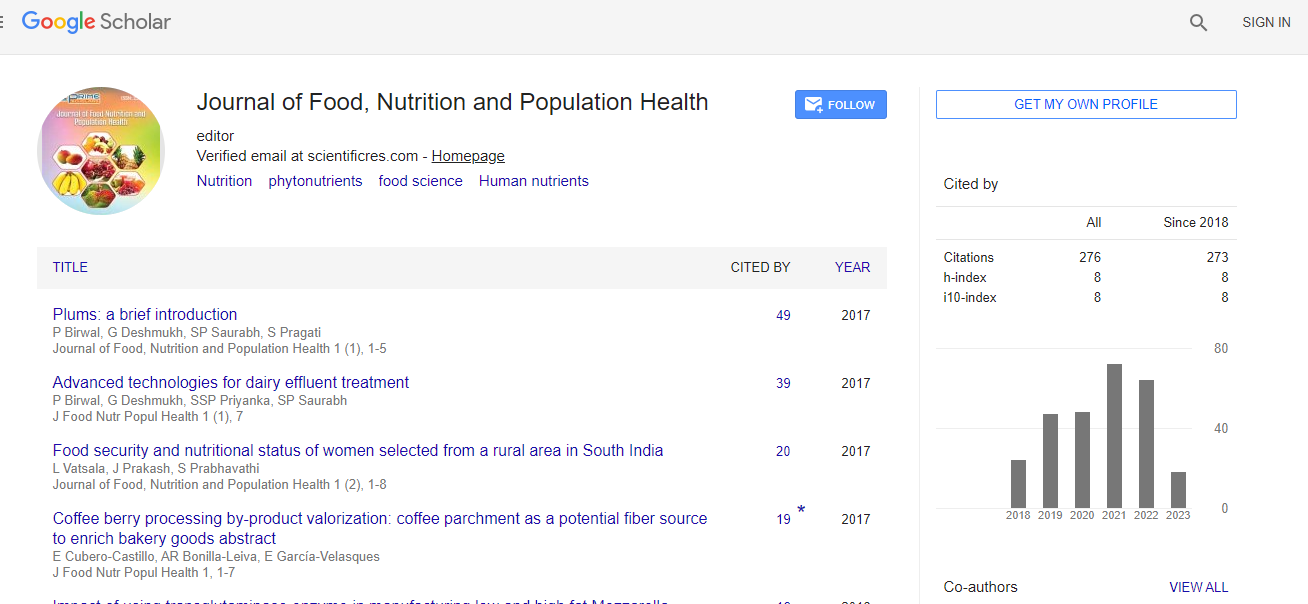Commentary - (2024) Volume 8, Issue 2
The Importance of Nutrition Intake: A Comprehensive Guide
Andrew Taylor*
Department of Biology, University of Waterloo, Canada
*Correspondence:
Andrew Taylor,
Department of Biology, University of Waterloo,
Canada,
Email:
Received: 29-May-2024, Manuscript No. IPJFNPH-24-20861;
Editor assigned: 31-May-2024, Pre QC No. IPJFNPH-24-20861 (PQ);
Reviewed: 14-Jun-2024, QC No. IPJFNPH-24-20861;
Revised: 19-Jun-2024, Manuscript No. IPJFNPH-24-20861 (R);
Published:
26-Jun-2024, DOI: 10.21767/2577-0586.8.2.15
Description
Nutrition intake is a fundamental aspect of human health,
influencing every facet of our well-being from physical
performance to mental clarity. In today’s world, where dietary
choices are abundant and often confusing, understanding the
principles of nutrition intake is crucial for maintaining optimal
health and preventing chronic diseases. This comprehensive
guide explores the essentials of nutrition, covering the key
nutrients, their sources, recommended intake guidelines, and
the impact of nutrition on various aspects of health. Nutrition
is the process by which our bodies obtain and utilize nutrients
from food for growth, repair, and maintenance. Nutrients
can be broadly classified into six categories: carbohydrates,
proteins, fats, vitamins, minerals, and water. Primary source
of energy for the body, particularly for brain function and
physical activity. Found in grains, fruits, vegetables, and
legumes. Essential for building and repairing tissues, producing
enzymes and hormones, and supporting immune function.
Found in meat, fish, poultry, dairy products, legumes, nuts,
and seeds. Provide energy, support cell growth, protect organs,
and help the body absorb certain nutrients. Found in oils,
butter, nuts, seeds, and fatty fish. About 20-35% of total daily
calories should come from healthy fats. Act as coenzymes and
cofactors in various biochemical reactions, crucial for immune
function, bone health, and many other processes. Found in
a variety of foods including fruits, vegetables, whole grains,
dairy products, and meats. Varies by nutrient; guidelines are
provided by health authorities based on age, sex, and other
factors. Essential for hydration, regulating body temperature,
transporting nutrients, and flushing waste products from
the body. Drinking water, beverages, and water-rich foods
like fruits and vegetables. Proper nutrition ensures adequate
energy levels for daily activities and exercise. A balanced diet
helps maintain a healthy weight, reducing the risk of obesityrelated
diseases such as diabetes and cardiovascular disorders.
Adequate calcium and vitamin D intake supports bone strength
and reduces the risk of osteoporosis. Fibber-rich foods promote
healthy digestion and prevent constipation. Omega-3 fatty
acids and antioxidants support brain health and may reduce the
risk of cognitive decline. Certain nutrients, such as B vitamins
and magnesium, play a role in neurotransmitter synthesis and
mood regulation. A balanced diet helps maintain mental clarity
and focus throughout the day. These vitamins play key roles in
immune response and antioxidant defence. Minerals essential
for immune cell function and antioxidant activity. Crucial for
the production of antibodies and immune system proteins. The
recommended daily intake of nutrients varies based on age,
sex, activity level, and overall health status. Based on individual
energy needs, typically ranging from 1,800 calories to 2,400
calories per day for adult women and 2,200 to 3,000 calories
per day for adult men. Specific recommendations for vitamins
and minerals vary; guidelines are provided by organizations
like the Dietary Guidelines for Americans and the World Health
Organization. Require careful planning to ensure adequate
intake of protein, iron, calcium, vitamin B12, and omega-3 fatty
acids. Essential for individuals with celiac disease or gluten
intolerance, ensuring they avoid gluten-containing grains while
maintaining a balanced nutrient intake. Individuals with food
allergies must avoid specific allergens while finding alternative
sources of essential nutrients.
Acknowledgement
None.
Conflict Of Interest
None.
Citation: Taylor A (2024) The Importance of Nutrition Intake: A Comprehensive Guide. J Food Nutr Popul Health. 8:15.
Copyright: © 2024 Taylor A. This is an open-access article distributed under the terms of the Creative Commons Attribution License, which permits unrestricted use, distribution, and reproduction in any medium, provided the original author and source are credited.

